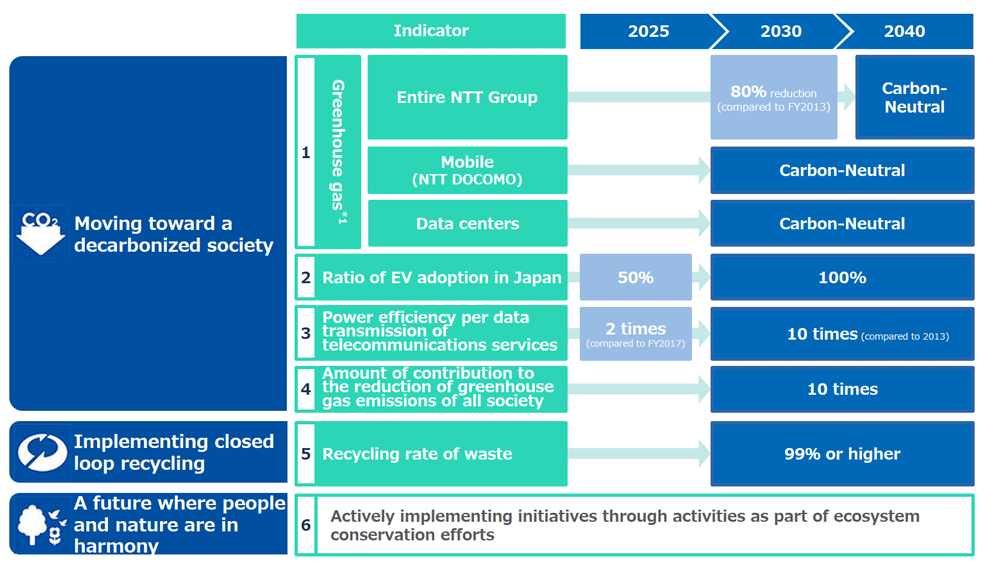Microsoft ends support for Internet Explorer on June 16, 2022.
We recommend using one of the browsers listed below.
- Microsoft Edge(Latest version)
- Mozilla Firefox(Latest version)
- Google Chrome(Latest version)
- Apple Safari(Latest version)
Please contact your browser provider for download and installation instructions.
Environmental Metrics and Targets
In November 2021, the NTT Group restructured its existing CSR Charter, which lays out the basic policy for CSR activities including environmental activities, and established the NTT Group Global Sustainability Charter. Based on this charter, the NTT Group will promote various initiatives to support our commitment towards a sustainable society. The IOWN concept will support these initiatives enabled by high ethical standards and cutting-edge technologies and innovation. The NTT Group will promote corporate and economic growth and, at the same time, will contribute to resolving social issues to realize a sustainable society.
Ensuring the coexistence of nature and humanity
The NTT Group is committed to achieving a new level of prosperity where humanity can coexist and preserve nature for generations to come. To this end, we will work to balance solving ecological problems and improving economic development by reducing the environmental impact of our business activities and creating new technologies and innovations.
To achieve this, we will set targets and implement activities based on the following three areas of focus:
Theme
Ensuring the coexistence of nature and humanity
We will contribute to reducing environmental impact while promoting the economic development of society.
Challenges
-
Moving toward a
decarbonized
society
The NTT Group is committed to initiatives that reduce greenhouse gas emissions throughout its business activities and society as a whole, by rolling out IOWN technology and increasing development and use of renewable energy sources.
-
Implementing
closed loop
recycling
We will shift from a one-time use consumption-oriented company to a recycling-oriented one. We will promote the effective use of resources throughout the entire life cycle of products and systems, from procurement to use and disposal.
-
A future where
people and nature
are in harmony
The NTT Group is working to preserve the ecosystems, which are the foundation of society's activities, while also conducting environmentally friendly business activities that take into consideration the mutual influence between ecosystems and the NTT Group.
Metrics and Targets
In accordance with the NTT Group's selection process for identifying key issues, key performance indicators (KPIs) have been established for verifying the practicality and effectiveness, and monitoring progress of initiatives covered by the three challenges of "Ensuring the positive coexisting of nature and humanity."

Disclosure Boundary
Greenhouse gas (No. 1), Amount of contribution to the reduction of greenhouse gas emissions of all society (No. 4): 964 Domestic and overseas Group companies (as of December 27, 2021)
Ratio of EV adoption in Japan (No. 2), Resource recycling rate (No. 5): 282 Domestic Group companies (as of December 27, 2021)
Power efficiency per data transmission in our telecommunications business covers the domestic operations of five companies: NTT East, NTT West, NTT Communications, NTT DOCOMO, and NTT DATA
*1GHG Protocol: for Scope 1 and 2
Environmental management
NTT Group Environmental Activities
NTT STORY
WEB media that thinks about the future with NTT










